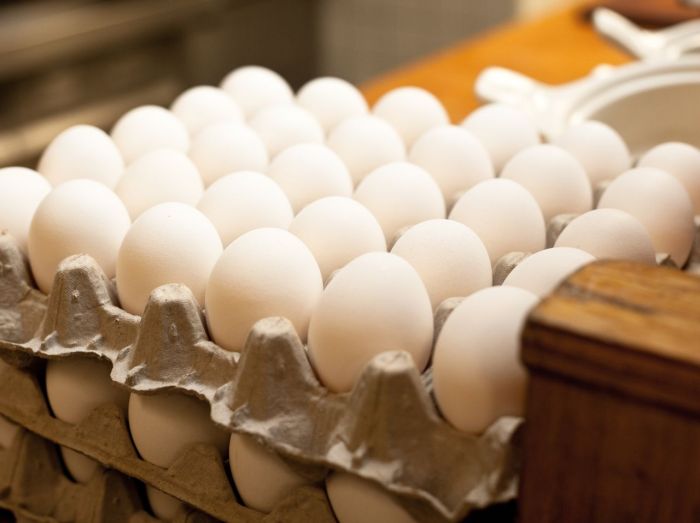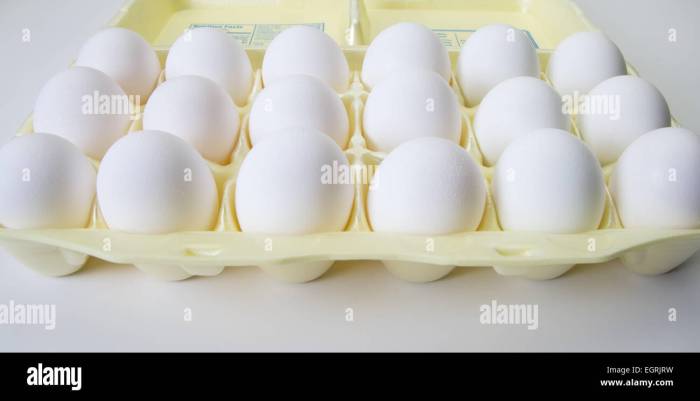A baker orders 162 eggs, a seemingly ordinary transaction that unveils the intricate world of baking and its reliance on this humble ingredient. Eggs, the versatile culinary workhorses, play a crucial role in countless baked delights, from fluffy cakes to flaky pastries.
In the realm of baking, eggs serve as binders, leavening agents, and emulsifiers, contributing to texture, structure, and flavor. The number of eggs used in a recipe, like the 162 in our baker’s order, directly impacts the scale of baking operations and the quantity of baked goods produced.
The Significance of Egg Order
Eggs play a pivotal role in the realm of baking, serving as a fundamental ingredient in a myriad of delectable creations. Their unique properties contribute to the texture, flavor, and overall quality of baked goods, making them an indispensable component in the baker’s arsenal.
Egg Usage in Baking, A baker orders 162 eggs
- Binding Agent:Eggs act as a binding agent, holding ingredients together and providing structure to baked goods.
- Leavening Agent:When whipped, eggs incorporate air into the batter, resulting in a light and fluffy texture.
- Emulsifier:Eggs help combine ingredients that would otherwise not mix, such as oil and water, creating a smooth and homogeneous batter.
- Flavor Enhancer:Eggs impart a rich, savory flavor to baked goods, complementing other ingredients.
Examples of Baked Goods Requiring Eggs
- Cakes
- Cookies
- Muffins
- Bread
- Pastries
Average Egg Consumption in Bakeries
The average number of eggs used in bakeries varies depending on the size and type of bakery. However, a typical bakery may use several hundred eggs per day, highlighting the substantial demand for this ingredient.
Baking Requirements and Egg Quantity

Eggs play a crucial role in baking, serving various functions that contribute to the texture, structure, and flavor of baked goods. They act as binders, providing cohesion to the batter or dough. Eggs also contribute to leavening, creating air pockets that result in a fluffy and light texture.
Additionally, eggs add richness, moisture, and flavor to the baked product.
The number of eggs used in baking significantly impacts the scale of operations. A large number of eggs, such as 162, suggests a substantial baking operation. This quantity can be used to produce a significant number of baked goods, depending on the recipe and the size of the batches.
Potential Batch Sizes and Baked Goods
With 162 eggs, bakers can produce various batch sizes and types of baked goods. For example, a single batch of cookie dough using this quantity of eggs could yield approximately 200-300 cookies, depending on the size and thickness of the cookies.
Alternatively, this number of eggs could be divided into smaller batches to create multiple types of baked goods, such as a batch of cupcakes, a loaf of bread, and a batch of muffins.
A baker ordered 162 eggs, an oddly specific number. Perhaps they were inspired by the tiao wei cheng qi tang divination method, which uses eggs to predict the future. Regardless, the baker used the eggs to create delicious pastries, leaving customers wondering about the significance behind their number.
Procurement and Logistics

Procuring eggs for a bakery involves establishing relationships with suppliers, determining the quantity needed, and ensuring efficient delivery and inventory management. Understanding these aspects is crucial for maintaining a smooth supply chain and meeting customer demands.
Supplier Selection
Selecting reliable suppliers is essential. Consider factors such as their reputation, quality standards, delivery capabilities, and pricing. It’s advisable to establish multiple suppliers to minimize risks and ensure continuity of supply.
Quantity Determination
Determining the quantity of eggs to order requires careful planning. Factors to consider include:
- Production volume:Estimate the number of baked goods produced and the average number of eggs used per item.
- Inventory levels:Maintain a buffer stock to cover unexpected demand or supply disruptions.
- Lead time:Consider the time required for delivery and adjust orders accordingly.
- Seasonality:Egg production can fluctuate during certain seasons, affecting availability and prices.
Efficient Procurement
Efficient egg procurement involves implementing best practices such as:
- Regular monitoring:Track inventory levels and project future needs to avoid overstocking or shortages.
- Negotiating contracts:Secure favorable pricing and delivery terms through negotiations with suppliers.
- Inventory management:Utilize inventory management systems to optimize stock levels and prevent spoilage.
Cost Implications and Optimization

Ordering 162 eggs for baking purposes involves significant cost implications that need to be carefully considered. Bakers must optimize egg usage and minimize waste to ensure cost-effectiveness and profitability.
Strategies for Optimizing Egg Usage
Several strategies can be employed to reduce egg consumption without compromising the quality of baked goods:
- Egg replacers:Using egg replacers, such as flaxseed or chia seeds, can significantly reduce the number of eggs required while maintaining the desired texture and flavor.
- Egg white substitutes:Egg white substitutes, such as aquafaba (chickpea brine), can be used to replace egg whites in meringues and other recipes.
- Egg yolk substitutes:Egg yolk substitutes, such as soy lecithin or silken tofu, can be used to replace egg yolks in recipes where richness and emulsification are desired.
Minimizing Egg Waste
In addition to optimizing egg usage, bakeries can also implement strategies to minimize egg waste:
- Proper storage:Eggs should be stored in a cool, dry place to maintain their freshness and prevent spoilage.
- First-in, first-out (FIFO) inventory management:Using eggs in the order they were purchased ensures that older eggs are used first, reducing the risk of spoilage.
- Egg breaking stations:Establishing egg breaking stations allows bakers to separate egg yolks and whites as needed, minimizing waste from unused portions.
Storage and Handling: A Baker Orders 162 Eggs

Eggs are a delicate food item that requires proper storage and handling to maintain their freshness and quality. Here are some key techniques to ensure that your eggs remain in prime condition:
Store eggs in the refrigerator at a temperature between 35-40°F (2-4°C). This temperature range helps to slow down the growth of bacteria and extend the shelf life of the eggs.
Keep eggs in their original carton and place them in the coldest part of the refrigerator, typically the back or bottom shelf. This helps to protect the eggs from temperature fluctuations and prevents them from absorbing odors from other foods.
Avoid washing eggs before storing them. The natural protective coating on the eggshell helps to keep bacteria out, and washing can remove this coating.
Use eggs within 45 days of purchase for optimal freshness. After this time, the quality of the eggs will begin to decline, and they may become unsafe to eat.
Discard any eggs that have cracks, dents, or other damage to the shell. Damaged eggs may be contaminated with bacteria, and it is not safe to eat them.
Store eggs away from strong-smelling foods, such as onions and garlic. Eggs can absorb odors from other foods, which can affect their taste.
Shelf Life of Eggs
The shelf life of eggs depends on several factors, including the storage temperature, the condition of the eggs when they were purchased, and the handling practices followed.
Under ideal storage conditions, fresh eggs can last up to 45 days in the refrigerator. However, once eggs are removed from the refrigerator, their shelf life is significantly reduced. Eggs that have been left out at room temperature for more than two hours should be discarded.
Eggs that have been hard-boiled can be stored in the refrigerator for up to seven days. However, peeled hard-boiled eggs should be consumed within two days.
Maintaining a Clean and Organized Egg Storage Area
To ensure that your eggs remain fresh and free from contamination, it is important to maintain a clean and organized egg storage area.
Wipe down the shelves of your refrigerator regularly with a mild cleaning solution. This will help to prevent the buildup of bacteria and odors.
Store eggs in a designated area of the refrigerator, away from other foods. This will help to prevent cross-contamination.
Use a clean spoon or egg separator to remove eggs from the carton. This will help to prevent the spread of bacteria.
Discard any cracked or damaged eggs immediately. Do not store them in the refrigerator, as they may contaminate other eggs.
Common Queries
What factors influence the quantity of eggs a baker orders?
The scale of baking operations, types of baked goods produced, and availability of eggs from suppliers are key factors.
How can bakeries reduce egg consumption without compromising quality?
Using egg substitutes, optimizing recipes, and implementing efficient egg handling practices can help reduce egg consumption.